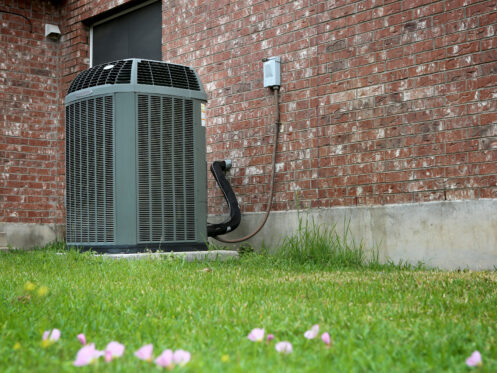When temperatures in Denver, CO plummet or soar, functional HVAC systems can maintain comfortable, livable conditions indoors. With refrigerant as their medium, air conditioners and heat pumps route hot air and humidity outside. Installed in your outdoor condenser, your HVAC compressor pressurizes and depressurizes refrigerant to pump it throughout your system. If your HVAC system is making strange noises, emitting foul odors, underperforming, or not performing at all, a failed or failing compressor could be the culprit. Read on to explore eight signs of AC and heat pump compressor problems.
1. Short Cycling
If left unchecked, many small and extremely common issues can gradually wear your compressor down. These include:
- Insufficient lubricant
- Low refrigerant
- Blocked suction lines
- Faulty wiring
Skipping annual heat pump or AC maintenance places undue stress on compressors and could cause them to overheat and short cycle.
Although short cycling can occur for many reasons, in this instance, it’s a protective measure. Before blower motors grow too hot and burn out, cooling systems shut themselves off. As operating temperatures decline, they turn back on until they overheat again. Letting this cycle continue can lead to permanent shutdown and total compressor failure.
2. Weak Airflow
Among the first signs of compressor trouble is weak airflow. If you have limited air coming out of your air vents or no air at all, turn your HVAC system off. Having your compressor inspected and repaired before problems spiral out of control will prevent the need for compressor replacement.
Weak Airflow at the Condenser Unit
With compressor problems, you might also have weak airflow at the outdoor condenser unit. When heat pumps and air conditioners extract heat from building interiors, they route it outside and release it at the condenser. Compressor problems can keep your cooling system from shedding heat and can lead to dangerous operating conditions.
3. Warm or Lukewarm Air Coming From Your HVAC Air Vents
If you have weak airflow and warm or lukewarm air coming from your air vents, you might have a refrigerant leak. Other signs of a refrigerant leak include:
- Loud noises during operation
- Frozen evaporator coils
- Rising humidity
- Increased electricity bills
When refrigerant leaks cause warm air to come from your vents rather than cold air, it means that your heat pump or AC can’t get enough coolant to the indoor air handler and its evaporator coil. This is also a sign that your compressor is under significant stress.
4. Hissing or Shrieking Sounds
When air conditioners have too little or too much refrigerant, compressors continue to pressurize and depressurize it. They aren’t sophisticated enough to adjust their operations to suit changes in refrigerant levels.
If you hear hissing noises coming from your compressor, this could mean that you have a refrigerant leak. As compressors struggle to pressurize declining refrigerant, they grow increasingly close to failure. Operating your heat pump or AC with insufficient refrigerant can cause your compressor to collapse.
Loud shrieking sounds are indicative of too much refrigerant. When performing refrigerant recharge service, HVAC technicians can make mistakes. Having too much refrigerant can cause subcooling and may flood your compressor with coolant and damage its mechanical components. Having excess refrigerant can also trip your cooling system’s circuit breaker or cause hot air to come from your air vents.
5. Rattling Noises
Rattling sounds could mean that one or more of your compressor’s components has loosened or detached and is moving around the condenser unit during blower motor and blower fan operation. Even when they aren’t excessively large or heavy, fast-moving parts can be hard-hitting. Thus, when your compressor starts rattling, it’s best to turn your HVAC system off and have it inspected.
Much like compressors, blower motors and blower fans are located in outdoor condenser units. If you think your compressor is making rattling sounds, there’s a good chance that your blower motor has lost a bearing or one of your blower fan’s blades is damaged or bent.
Debris and Pests
Outdoor condenser units are extremely attractive to insects and small critters, especially in cold winter climates like Denver’s. There’s always a possibility that rattling noises are the result of pests, nests, or buildups of detritus that pests commonly leave behind. Rattling noises can also be the result of trapped, windblown debris like small rocks and twigs.
6. The Compressor Won’t Turn On
AC and heat pump compressors require more electricity than residential electrical systems can supply at once. This is true both at startup and throughout cooling cycles. To overcome this shortcoming, your cooling system has one or two capacitors. Some systems have run and start capacitors. Others have dual capacitors that cover both run and start functions.
Capacitors harness electricity and store it. This allows them to provide the intense burst of energy that cooling systems need when first turning on and steady, measured electrical output to power their cooling cycles. If your cooling system won’t start up or if it runs but cannot initiate or complete a cooling cycle, you may have a failed capacitor.
7. Frequently Tripped Circuit Breaker
If your air conditioner repeatedly trips its circuit breaker, your compressor may be overheating. This can happen if your AC is drawing too much power due to electrical malfunction. Damaged wires, faulty electrical contacts, and recurring, unprotected power surges are all common causes of electrical malfunction in HVAC systems.
8. Strange Odors
Compressor problems can also create a variety of unpleasant odors. If you’re getting insufficient air or warm air from your vents, your heat pump or AC isn’t extracting humidity. Obstructed airflow and insufficient temperature and humidity control can fill your home with damp, moldering odors or make it smell like dirty laundry.
Gunpowder Smells and Burnt, Fishy Odors
If your AC compressor is having electrical problems, check for the smell of burnt wiring near the outdoor condenser unit. If you smell a gunpowder-like odor or a slightly sweet, fishy smell, this may be due to worn wiring insulation, burnt wires, or a faulty circuit.
What to Do If Your Compressor Is Failing
All new heat pumps and air conditioners come with manufacturers’ warranties. These warranties cover the repair or replacement of faulty components when problems occur due to defective parts, incorrect assembly, or other errors caused by equipment manufacturers. These guarantees typically include limited parts warranties that last five to 10 years and compressor warranties that last 10 to 12 years. If your compressors’ warranty is still active, turn your AC off and submit a warranty claim.
Your compressor is easily your cooling system’s most costly component. Thus, prevention is always the cheapest solution. To keep your compressor functioning as it should, have your air conditioner professionally serviced at least once each year. If you have a heat pump instead and use this appliance for year-round climate control, schedule tune-up service just before winter arrives and again before the summer season.
Homeowners in Denver can count on us for expert heating, cooling, plumbing, and electrical services. We also provide air quality improvements, HVAC air duct sealing, duct cleaning, and comprehensive home energy audits. If you have a faulty HVAC compressor, contact Summit Heating, A/C, Plumbing & Electrical to schedule an AC repair appointment.


